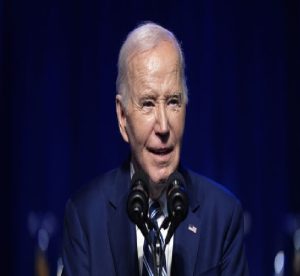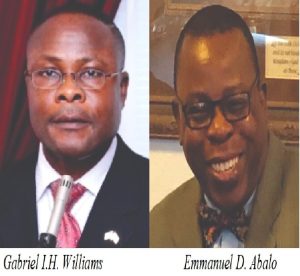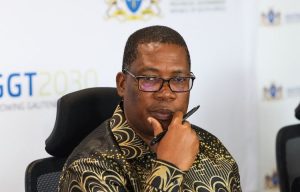Joseph Boakai Describes Liberia as a ‘Narco State’ under Weah Government

Paynesville – Drug abuse and illicit trafficking continue to remain a menace in Liberia, with the government failing to win a recent legal proceeding that saw a US$100 million case of cocaine allegedly smuggled into Liberia favoring four defendants.
By: Willie N. Tokpah/0777039231
This setback in the fight against drug abuse and illicit drug trafficking comes just a few weeks after the world celebrated International Drugs Day on Monday, June 26.
The International Day against Drug Abuse and Illicit Trafficking, or World Drug Day, is marked on June 26 every year to strengthen action and cooperation in tackling drug abuse.
However, former Vice President and Political Leader of the Opposition Unity Party, Joseph Nyumah Boakai, is apprehensive about the surge in drug abuse and illicit trafficking of narcotic substances into Liberia, which he believes has branded the country a “Narco State.”
“We are fast gaining notoriety as a transshipment country for illicit narcotics, with the country shamefully appearing now as a ‘narco-state’,” Amb. Boakai stressed.
In a press statement on Monday, June 26, in observance of the International Day against Drugs, Boakai panicked that Liberia stands to face a possible future of increased crime rates, unemployment, increased sexual and gender-based violence, HIV/AIDS, teenage pregnancy, and tuberculosis, among others, if strong measures are not put in place to curb illicit drug usage and trafficking.
He asserted that the country’s weak law enforcement capacity, porous borders, and proximity to major drug transit routes are contributing factors to trafficking to and through Liberia.
Boakai cited the recent seizure of US$100 million worth of drugs, the trial saga that ensued, and the mysterious and unexplained departure from the country of all those who stood trial and were “acquitted” as an indication of the extent to which he believes Liberia has been rapidly exposed in the last few years to the narco trade, and the vulnerability of Liberian society to the impact of such large-scale assault by international criminal enterprises.
He said that this occurrence significantly reveals the “failure of national leadership, a weak and criminal justice system, and crucially raises suspicion” about the probable complicity of some higher-ups in the drug affair.
He added that it is now clearly obvious that the Weah Administration is “incapable, unwilling, complicit, and indifferent” to this crisis.
“They don’t see it as most Liberians see it – A National Emergency.”
“This is why a change in national leadership is and should be now.
We must see our votes as an opportunity to reverse this dangerous trend by saving our children and securing their future.”
Nevertheless, he surmises that this “grave situation” can be addressed by providing responsible leadership that would institute appropriate measures to bring hope to the young victims of the epidemic, relief to hurting families, and assurances, to frankly, a shocked society.
He said this will include declaring it not just an ’emergency’ but a “national security crisis” that must be arrested through a system-wide approach.
The Unity Party Political Leader understands that doing so will require looking at the crisis and determining the extent to which the failure of the provision of public goods, social service delivery, weaknesses in the criminal justice system, and inadequacies of the public health system have all conspired to contribute to what may yet be the biggest threat to the society after the civil war.
Amb. Boakai said drug abuse and subsequent addiction is a scourge with dire consequences and a major cause of a lost future for many young people.
He said, “Abusers of drugs are prone to mental health illnesses and high suicidal tendencies, and may also die prematurely due to drug overdose.”
“As already mentioned, dependency on drugs often leads to crimes, which put both the users and society in peril.”
He is pained that these young people are stigmatized and face harsh societal isolation, resulting in the country’s potential demographic dividend stemming from a substantially young population who are faced with an existential threat, with Liberia at risk of losing its possible productive manpower base, especially given the high rate of school dropout among young drug users.
Additionally, he said the country is gradually losing its next generation to drug abuse, and if practical actions are not taken urgently, the prospect of future generations inheriting a more complex and challenging national situation looms large.
Therefore, Boakai divulged that over the past few weeks, he has consulted and extended appreciation to many Liberians and partners who continue to work tirelessly to support efforts aimed at mitigating the drug abuse tragedy by working with unsuspecting victims who have become chemically dependent on these substances.
“I would personally like to thank Reverend Caleb Domah of the Metro Harvest Church and Youth-Connect Liberia, the online influencer Ms. Josephine Kolubah of ‘Coffee with JoJo’ fame, and many others,” he maintained.
Accordingly, Boakai mumbled that the increasing exposure of Liberians, particularly the youth, to drug abuse and addiction through ready access to banned substances, if not immediately arrested, will have enormous health, social, economic, and security implications on the country.
“I view it as a threat to our national security and must be elevated to a National Emergency,” he added.
“The statistics cannot be more stark! It is estimated that 2 in 10 youth in Liberia are users of narcotic substances. Some estimates have it that about 13% of the population is affected by drug addiction.”
He also expressed concern over police reports on the increase in drug-related crimes, something that had accordingly made the correlation between substance abuse and crimes equally worrying.
This, he thinks, has led to young people who live in so-called ghettos strewn across this country, in cemeteries, on the streets, and in other unsavory places often resorting to crimes, including armed robberies, to support their overwhelming desire to continue using narcotics.
These crimes and their effect on victims and those who commit them, according to Ex-VP Boakai, are heartbreaking, fearing that they are motivated by the drive for drugs.
He said, “Currently, there are over 866 ghettos in Monrovia serving as homes to chronic drug users.”
“These ghettos are associated with illicit activities, including launching pads for drug-related crimes. Nationwide, everyone living in urban areas knows the location of at least one ghetto, with the increasing presence in most communities of shoes strung over power lines, signifying that a ghetto is nearby.”
Hence, to this end, Boakai announced action to immediately undertake the establishment of rehabilitation and reintegration programs with the best professionals aimed at providing some of the best clinical care for those who have become addicted and dependent on these chemical substances.
These programs, according to him, will also be coordinated with non-profit organizations and other individuals currently engaged in small-scale interventions such as non-clinical and limited drug treatment services for substance users in Liberia.
Moreover, he noted that this effort will develop an all-encompassing public health program focused on information, education, and research in combating drug and substance abuse.
Boakai said the program will target schools and communities to prevent and protect young people from falling prey to drug use. In this way, the system will be able to equip those mainly targeted by drug dealers to develop resilience and resist the peril from having a stranglehold on the youth.
“Third, but not least, we will strengthen law enforcement to deal with the source of the drug problem in the country. For years, the criminalization of this epidemic has targeted drug use and addicts, allowing drug dealers and their criminal networks to operate under the radar of the law.”
In Boakai’s view, the most egregious of the drug offenders are those who make the drugs, ship them to the shores of Liberia, and others who sell them locally to children, terming them as criminals who operate along the supply chain of the trade.
Having law enforcement aimed at disrupting the supply of drugs to the country is something Boakai sees as one of the best strategies to rid drugs.
He noted, “In this regard, we promise to enact very strong laws that will severely punish traffickers and their middlemen who operate in the open market by offering maximum prison sentences.”
“We will go after these criminals and smoke them out from their hideouts.”
In the meantime, he named robust legislation, training, and adequate resourcing as methods that will be aimed at supporting the National Drug Enforcement Agency (LDEA) to work with the Liberia National Police, the National Immigration Services, and border patrol to diminish the preponderance of the drug problem in the country.
“Fellow Liberians, you will agree with me that drug use and related crimes have affected nearly every family and threaten to undermine the very values of our society. We must not allow this to happen! The scale of the drug problem shows the Weah government’s nonchalant attitude towards one of the most critical issues confronting Liberians today, as they have no plans to address it.”
“I promise to declare war on drug trafficking and use it when elected, which is why the decision you make on October 10 would be one of the most consequential in your lifetime. I implore you to remain vigilant and know that help is on the way to salvage our young people and society from ‘kush’ and the throes of this epidemic.”
In a separate development, the Public Health Students Association at the state-run University of Liberia on Monday, June 26, joined the observance of International Drugs Day with a campaign aimed at ending stigmatization against narcotic substance users.
Anthony Saah Bongee, President of the Public Health Students Association, in an interview during an awareness campaign in Duport Road, noted that users of illicit drugs are victims and must not be bullied.
He said bullying drug users will not help them desist from said habit but will only stigmatize and make them feel depressed.
However, he feels counseling them to leave the habit is the best way forward.
Meanwhile, Bongee noted that as the world observed International Drug Day, it was important that everyone, including stakeholders in the country, join the strive to put an end to drug abuse in Liberia.








